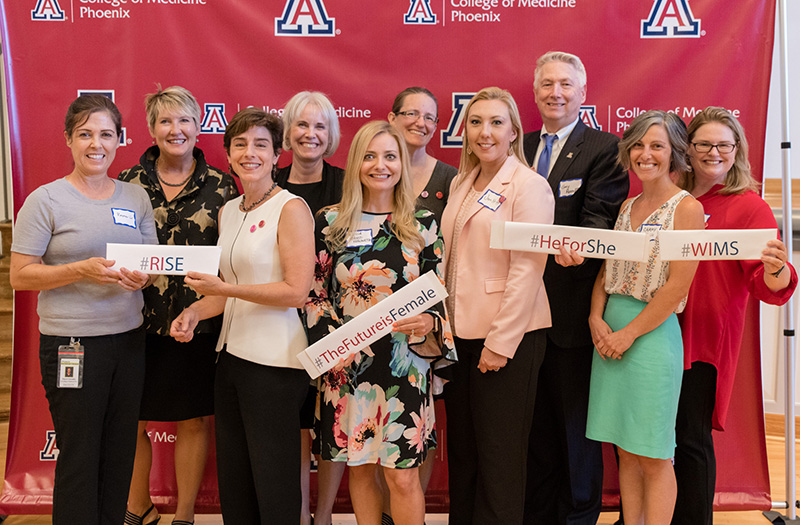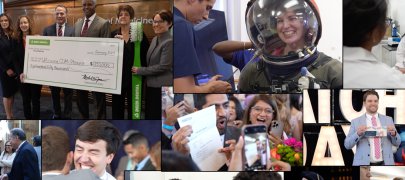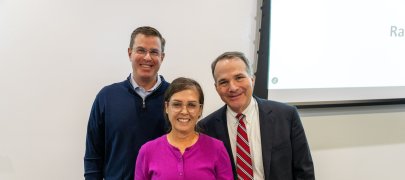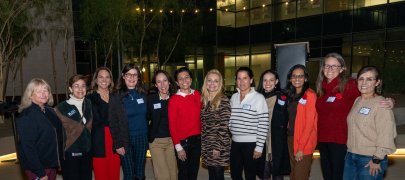
University of Arizona College of Medicine – Phoenix Focuses on Elevating Women in Academic Medicine

Roughly half of medical and biological sciences doctoral students in the U.S. are female, yet only 37 percent advance to medical school faculty. While 30 percent of male full-time faculty are full professors, only 13 percent of female full-time faculty advance to this highest level.
The University of Arizona College of Medicine – Phoenix along with the Women in Medicine and Science (WIMS) group is dedicated to promoting the advancement, leadership and success of women faculty in all roles within academic medicine and science. The goal is to create a supportive and instructive network to promote women physicians and scientists into leadership positions and mentor others who hope to pursue careers in medicine or science.
On Nov. 8, from 11:30 a.m. to 5:00 p.m., the National Women Thought Leaders in Academic Medicine met on the Phoenix Biomedical Campus to share insights on fostering a thriving WIMS program.
The conference included insights from:
- Amelia Gallitano, MD, PhD, associate professor of Basic Medical Sciences and Psychiatry, as well as director of Women in Medicine and Science, College of Medicine – Phoenix.
- Elizabeth L. Travis, PhD, associate vice president of Women and Minority Faculty Inclusion and Mattie Allen Fair Professor in Cancer Research, University of Texas MD Anderson Cancer Center.
- Cheryl O'Malley, MD, associate dean of Graduate Medical Education at the College of Medicine – Phoenix.
- Martha Gulati, MD, MS, chief of the Division of Cardiology, College of Medicine – Phoenix.
- Guy Reed, MD, MS, dean of the College of Medicine – Phoenix.
- Susan M. Pollart, MD, MS, senior associate dean for Faculty Affairs and Development and Ruth E. Murdaugh Professor of Family Medicine, University of Virginia School of Medicine.
- Indu Partha, MD, assistant professor of Medicine, Division of Geriatrics, General Internal Medicine and Palliative Medicine, University of Arizona College of Medicine – Tucson.
- Jaime D. Lewis, MD, associate professor, Department of Surgery, career advisor, Office of Student Affairs, University of Cincinnati College of Medicine.
- Troy S. Buer, PhD, director of Faculty Development and Special Projects, assistant professor of Medical Education, University of Virginia School of Medicine.
- Amparo Villablanca, MD, Frances Lazda Endowed Chair and director, Women's Cardiovascular Medicine; director, Program for Advancing Leadership Across the Health Sciences, and professor of Cardiovascular Medicine, University of California, Davis.
- Diana Lautenberger, MAT, director of Women in Medicine and Science, American Association of Medical Colleges.
- Valerie M. Dandar, MA, director of Operations, American Association of Medical Colleges.
- Elizabeth Elinas, MD, associate dean for Women's Leadership, director of the MCW Center for the Advancement of Women in Medicine and Science and professor of Anesthesiology, Medical College of Wisconsin.
About the College
Founded in 2007, the University of Arizona College of Medicine – Phoenix inspires and trains exemplary physicians, scientists and leaders to optimize health and health care in Arizona and beyond. By cultivating collaborative research locally and globally, the college accelerates discovery in a number of critical areas — including cancer, stroke, traumatic brain injury and cardiovascular disease. Championed as a student-centric campus, the college has graduated more than 900 physicians, all of whom received exceptional training from nine clinical partners and more than 2,700 diverse faculty members. As the anchor to the Phoenix Bioscience Core, which is projected to have an economic impact of $3.1 billion by 2025, the college prides itself on engaging with the community, fostering education, inclusion, access and advocacy.


